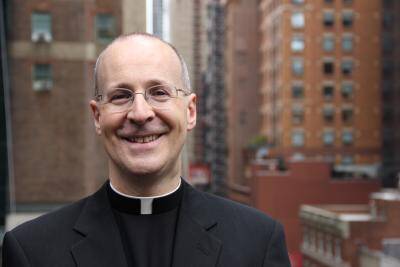Everybody knows that same-sex marriage and homosexual acts are contrary to Catholic moral teaching. Yet that same teaching also says that gay and lesbian people must be treated with “respect, sensitivity and compassion.” As more states pass laws legalizing same-sex marriage, more gay and lesbian Catholics are entering into these unions. This leaves some Catholics feeling caught between two values: church teaching against same-sex marriage and church teaching in favor of compassion. In Seattle a few months back, for example, many high school students protested the ouster of the vice principal, who was removed for marrying another man.
Most people who oppose same-sex marriage say they do not hate gay people, only that the traditional understanding of marriage is important and perpetually valid. Other opponents of same-sex marriage invoke the oft-repeated mantra, “Hate the sin, love the sinner.” If that is so, then why do so many gay people say they feel hatred from members of the church?
Let me suggest a reason beyond the fact that many gays and lesbians disagree with church teaching on homosexual acts: only rarely do opponents of same-sex marriage say something positive about gays and lesbians without appending a warning against sin. The language surrounding gay and lesbian Catholics is framed primarily, sometimes exclusively, in terms of sin. For example, “We love our gay brothers and sisters—but they must not engage in sexual activity.” Is any other group of Catholics addressed in this fashion? Imagine someone beginning a parish talk on married life by saying, “We love married Catholics—but adultery is a mortal sin.” With no other group does the church so reflexively link the group’s identity to sin.
The language of “hate the sin, love the sinner” is difficult for many gay people to believe when the tepid expression of love is accompanied by strident condemnation. And the notion that love calls first for admonishing the loved person seems to be applied only in the case of gays and lesbians. To take another example, it would be like telling a child, “You’re a sinful child, but I love you anyway.” This can end up sounding more like, “Hate the sinner.”
Look how Jesus loved people who were hated in his day. Take the story of Zacchaeus, the diminutive man who climbs a sycamore tree to catch a glimpse of Jesus as he passes through Jericho (Lk 19:1-10). As chief tax collector, and thus head of all the tax collectors in the region, Zacchaeus would have also been seen by the Jews as the chief sinner in the area. When Jesus spies him perched in the branches, he calls out, “Zacchaeus, hurry and come down, for I must stay at your house today.” Zacchaeus then promises to repay anyone he has defrauded. “Salvation has come to this house,” says Jesus.
Notice that Jesus shows love for Zacchaeus even before the man has promised to do anything. That is, Jesus loves him first, by offering to dine with him, a powerful sign of welcome in that time. Jesus does not say, “Zacchaeus, you’re a sinful person because you’re gouging people with taxes collected for the oppressive occupying power, but even though you’re a public sinner, I love you anyway.” He simply loves him—first.
The story of Zacchaeus illustrates an important difference between the ministry of John the Baptist and of Jesus. For John the Baptist, conversion came first, then communion. First you repent of your sins; then you are welcomed into the community. For Jesus, the opposite was more often the case; first, Jesus welcomed the person, and conversion followed. It’s not loving the sinner; it’s simply loving.
What might it mean for the church to love gays and lesbians more deeply? First, it would mean listening to their experiences—all their experiences, what their lives are like as a whole. Second, it would mean valuing their contributions to the church. Where would our church be without gays and lesbians—as music ministers, pastoral ministers, teachers, clergy and religious, hospital chaplains and directors of religious education? Infinitely poorer. Finally, it would mean publicly acknowledging their individual contributions: that is, saying that a particular gay Catholic has made a difference in our parish, our school, our diocese. This would help remind people that they are an important part of the body of Christ. Love means listening and respecting, but before that it means admitting that the person exists.








